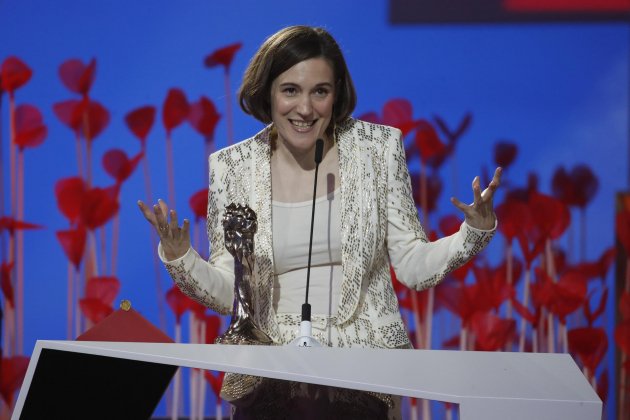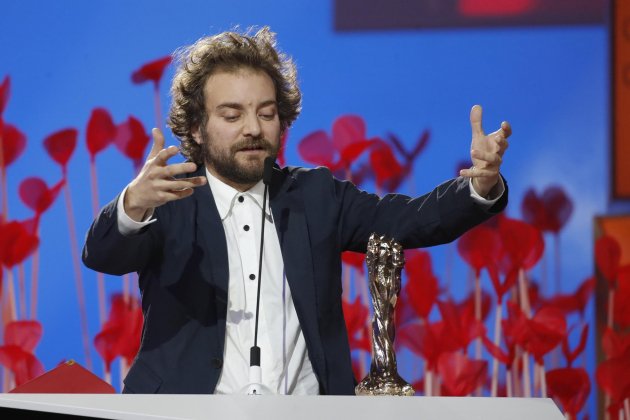It seemed destined to be the exclusive night of Alcarràs, but the name that was most present was brought about by an absence: the passing of Agustí Villaronga. It is still curious that the Catalan director of Pa negre (Black Bread) left this earth on the day of the fifteenth Gaudí Awards ceremony, as if it were his modest and humble way of giving way to the new voices of Catalan cinema for whom he undoubtedly was an example. Judith Colell, president of the Catalan Film Academy, said: "A colossal reference point and a great friend has died, and I would like this gala to be dedicated to him. Let us pay tribute to him with every tribute we give here." With this sad and forced generational relief, the film of the year, this Alcarràs that has brought so much joy to the cinema of our country, won the award for best film and director Carla Simón established herself as the enormous filmmaker who, as best director, is the fourth woman in a row to take home this valued award, and her own second statuette after Estiu 1993 (Summer 1993).
The story of the Solé family and their peach groves also won best screenplay, best production direction and the audience prize. "For all the farmers in the Ponent region, who are stubborn and cultivate the land," explained Simón. And she took the opportunity to make a call to help the mistreated economic sector that she tried to dignify cinematically. "Political leaders here, the [growers] are in a bad way; if the price of fruit could be regulated, it would be great," she demanded. And to everyone else, the public, the viewers, the people on the street: "Buy fruit and local products."

After success at France's Lumière Awards a few days ago, Pacifiction shared the spotlight with Simon's film, taking home the Gaudí for best film in a non-Catalan language, art direction and photography. Albert Serra's eccentric and extravagant proposal, a largely Catalan production shot in French, completely ignored by the nominations for Spain's Goyas Awards, thus emerged on the night as one of the films which most appealed to the Catalan Film Academy, although the film that accumulated most awards was Un año, una noche ("One year, one night"), which took five 5 technical awards - for visual effects, sound, editing, best adapted script and original music (by Raül Refree) - which, through its subject matter, also paid tribute to the victims of the terrorist attacks at Paris's Bataclan theatre in 2015.
Carla Simón: "Political leaders: the growers are in a bad way, if the price of fruit could be regulated, it would be cool"
In the acting prizes, it was the night that Vicky Luengo and Pol López consolidated their presence on the scene. The pair took away the two statuettes for actors in leading roles for Suro ("Cork") playing a couple who move to the countryside to revive a cork tree plantation and start a new life. Mikel Gurrea's debut has stood out in recent months as a minor masterpiece, giving Luengo her first cinematographic award and López his first Gaudí, and each of them dedicated their own award to the other: a duo who have earned a privileged place in the firmament of the best acting roles of this year.

A dynamic gala with no frills, standing up for cinema in Catalan and denouncing sexual abuse
The best supporting role awards went to Alex Brendemühl for one of the short stories in Historias para no contar ("Stories not to be told"), from director Cesc Gay, and Ángela Cervantes, who collected her second consecutive acting prize at the Catalan cinema awards after success last year with Chavalas. This time she won with La Maternal and, visibly emotional, she dedicated the award to the work of social educators and the teenage mothers who inspired her. "You can't leave an underage teenage mum on her own. This is your story, thank you for your generosity and for letting me be a channel," she said with a trembling and broken voice. She also thanked her director, Pilar Palomero, for the opportunity, and especially Carla Quílez, who shortly afterwards picked up the new acting prize of the night - the award for best revelation performance. Only 14 years old and showing her star quality, Quílez what must have been one of the most affecting speeches of the night, also remembering the young women who go through pregnancy with limited resources. "For these teenage mothers who have suffered so much; today I can give them a voice to make these cases visible; so that what is not seen also comes to light and for this [film] to be another step in doing that."

The Gaudí award for best documentary made a statement against sexual abuse and the silence of a system that looks the other way. Five of the protagonists of El sostre groc ("The yellow ceiling") collected the award for the work by Isabel Coixet - absent from the gala - about the sexual abuse perpetrated for years on minors in the Aula de Teatre de Lleida, a production that would not have been possible without the reporting by Núria Juanico and Albert Llimós, journalists from the newspaper Ara. Their own case was time-barred, but they warned of a terrifying figure: 2 out of every 5 minors will suffer sexual abuse. They asked politicians for resources, thanked their lawyer Carla Vall and dedicated it to "all those report their cases and all those who dared to explain", ending with a brave shout in unison against the perpretators: "You will all fall!"
And the best short film went to Harta (Sick of it), from Júlia de Paz Solvas, a piece that explains the cycle of male violence through the eyes of the daughter of an abuser and his victim. "Violence goes far beyond a punch, the silence hurts a lot," asserted its creator. Llum Barrera, master of ceremonies, also recalled this murderous charade and pointed out that it was the first time in the history of the Gaudí family that the presenter was a single woman. Once in fifteen years. A figure that collides with the more-positive fact that more than 50% of nominees this year had a woman's name.
The protagonists of El sostre groc, winner of the best documentary for its denunciation of the sexual abuse in the Aula de Teatre de Lleida, shouted as they collected their award: "You will all fall!"
The homage to those from the industry who died in the last year recalled, among many others, Pau Riba, Juan Diego, Núria Feliu and Àngel Casas, before the tribute closed with Agustí Villaronga, so remembered on this first night without him. Legenadary Catalan film critic Jaume Figueras also wanted to dedicate his Gaudí of honour to the director who gave Catalan cinema its most exposure in recent decades.

It was not a gala with many flourishes and the pace was fast despite the addition of three new categories. Three hours to stand up proudly for this year's Catalan cinema, the language and survival of the culture, but above all to demand responses, resources and explanations from institutions and digital platforms, the last-named responsible for the fact that viewers are increasingly moving away from the cinema. "It shouldn't be necessary to win a Golden Bear in Berlin to appreciate Catalan cinema, nor should it be necessary to ask that Catalan be a common language in theatres and platforms," protested Colell. Nor was there a lack of political demands made, with the president has complained that a motorway (referring to the famous Fourth Beltway) must not be a reason for the Catalan budget to fail and to leave culture, education and healthcare hopping on one foot. Because, as the leader of the Catalan Academy said, "it is no coincidence that culture and cultivate are words with the same etymological root".
Complaints, memories and tears, but above all love for art, were intertwined in a night that strengthened the will for cinemas to be filled. This is what the Cicle Gaudí is trying to do: a project that brings local films to every corner of Catalonia and dignifies a seventh art weakened by the rise of the platforms. As a glimmer of hope, the oldest cinema in Catalonia, the Sala Mozart in Calella, was the host of the special prize voted by the public, which went to Alcarràs with votes from 6,000 people. "What happened with Alcarràs has been like a small miracle because many people have seen it," said Carla Simón when she picked up the prize. And the fact is that the film shot in the rural areas of Lleida has reached more than 400,000 viewers and the hearts of many, many more people.

